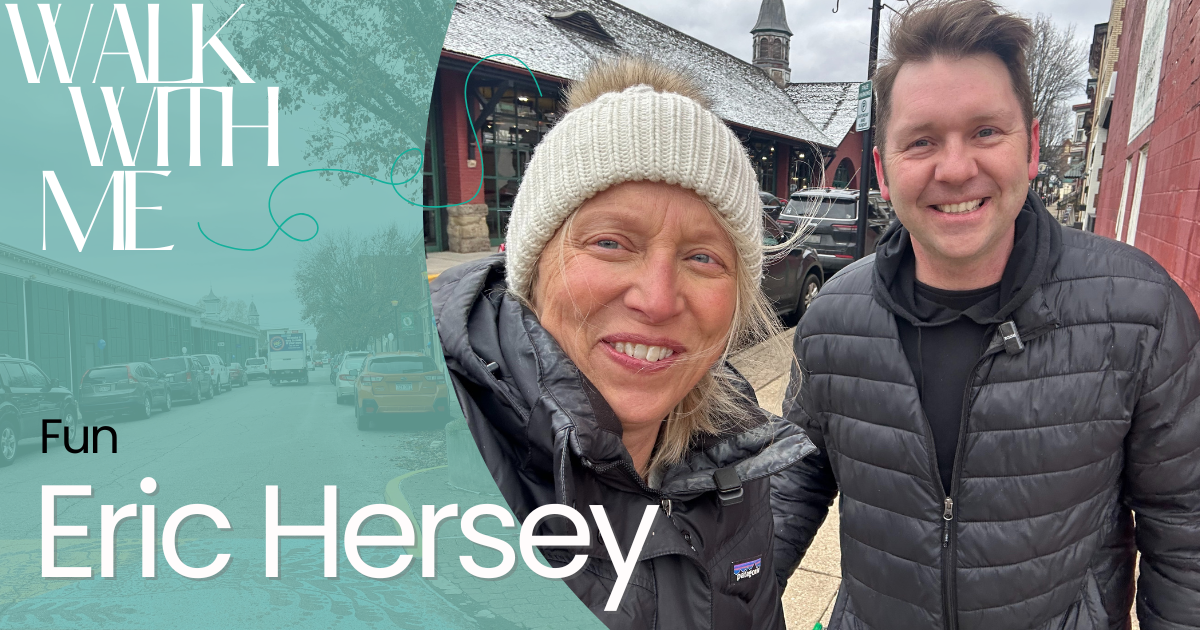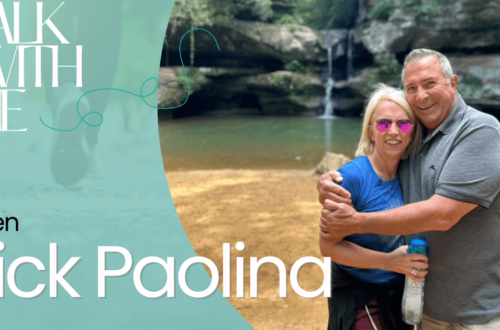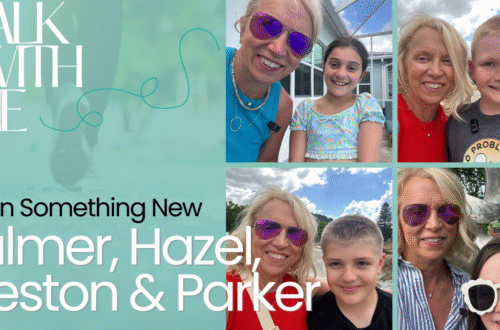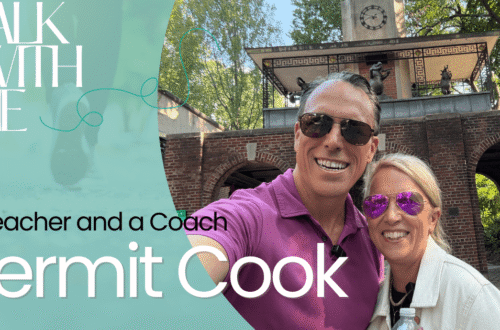For some, walking is not just about moving from one place to another; it is an interactive experience. The act of walking can be a canvas for creativity, providing both the physical and mental space to explore new ideas. For Eric Hersey, founder of Strong Minded and a self-proclaimed nerd, a walk was never just a walk. It was a time to take photographs for a Google Local Guide or listen to a podcast… or write a blog. In his case his walks led to a myriad of creative pursuits and fueled the birth of an entrepreneurial journey.
Eric: I had to give myself a task…something to do. It was very difficult for me just to walk for the sake of it, although it’s the most therapeutic thing that I can do.
Liz: What is?
Eric: Walking. I’m a busy body, so I have… I’m not supposed to call it nervous energy, but I have nervous energy.
Liz: Why aren’t you supposed to call it that?
Eric: I don’t remember why. The therapist told me to call it something else, and I don’t remember why.
Liz: Oh, because when you call it nervous energy, it’s a self-fulfilling prophecy. You’re naming it.
Eric: Right. Well, for me, it was just a matter of like, I’m the key person who needs a fidget spinner. I don’t take notes when I’m talking to people, but I doodle. And it’s not that I notice anything that I’m doing. It’s just that’s how I pay better attention. It’s like I’m always on three cups of coffee.
Liz: But you’re not.
Eric: Most of the time I am, so that would be the equivalent of six. It’s probably not good for me.
Such a mind operates in perpetual motion, constantly generating ideas, making unexpected connections, and exploring possibilities that others might overlook. This restless quality serves as an internal engine, pushing such a creative person forward even when facing obstacles or setbacks.
Eric’s mind excels at divergent thinking— he doesn’t settle for obvious answers, but considers alternatives that might seem impractical or bizarre to others but often lead to breakthroughs. The combination of creativity and nervous energy creates a natural resistance to stagnation.
Liz: So this high frequency you live at, that’s what gives you your hustle to create your own business?
Eric: No, I think maybe. I think I had a conversation with my brother as if it’s a superpower, is ADHD or whatever I deal with a superpower? I think it is in a way because just walking around I’m taking pictures of stuff. Kennen and Kennen have most of their pictures on their Internet because I walked by it so many times. That’s part of the hustle – I always have something worth doing and something I plan on doing. Sorry, sharp turn.
Liz: That’s all right.
Eric: But it drives me in a way because I always have a task. I always have 20 different things that I want to do, and it excites me, and it gives me purpose. But it’s also quite a burden.
I equate it to… If you had a superpower and you could fly, that’d be really cool. Everybody out there would be like, “Man, I’d really like to have that superpower.” But the guy who has to fly all the time, that has to save the people out of the burning buildings all the time, can’t sit down and watch a movie because they have this burden that they can always fly. I equate it like that.
Liz: I can’t imagine that work isn’t play for you.
Eric: We try. I try. That’s been the biggest struggle I’ve had over the last couple of years. For me, I always said I needed enough FU money to tell a client to F off. I never wanted to work for the man because I got out of that for a reason. That’s why I wanted to do this and been very fortunate and blessed to run across people to help me along the way. But as you bring on employees and stuff, you lose a little bit of the FU money, which means you have to do stuff you don’t necessarily like to do or want to do. And that’s the most difficult thing I deal with now. I want it all to be fun because it’s a design agency. It should all be fun. We get to make videos, we get to make websites, pictures and stuff. And that’s what I did for fun. Then I merged it with work, and now it’s a little cloudy at times.
Creating the team was just what Eric needed, but the polarity is that it made him worry about money instead of focusing on the creativity that drives him. Eric’s creative mind bursting with caffeinated energy often serves as a catalyst within their team, inspiring others with his enthusiasm and unconventional perspectives. He takes on more projects than he dares to count at times. When channeled, his energy is a powerful force for innovation and sparks collective creativity through a refusal to accept limitations or conventional wisdom. I love a meeting with Eric when the entire mood seems to be based on the wonder, What if we…?
Liz: But when I meet with you and Luke at “the office,” as Luke calls it, inevitably, without meaning for it to happen, a brainstorm happens of something we could do differently or better even if we don’t have it on the agenda. And I think that is something you need to articulate because you’re part of that equation. It takes all three of us there for this project to happen.
Eric: Well, I think you have to have the right people sometimes that have to be open to the flow and also appreciate what you bring. I mean, there’s a lot of times I go into meetings and they’re just not willing to think of the different options. I mean, truthfully, I would really look forward to going down to talk at the Country Day. It might have been Luke, it might have been whoever else was in the room. I don’t know. But it was the team that I needed… I felt like I was alone, and I think that’s one of the struggles not too many people know when your a solopreneur because you can’t talk to anybody else about your business. There’s nobody there. You’re going through these struggles. You don’t know how to make the decisions. There’s nobody to bounce ideas off of. But it’s so much better when you have other people. And I’m very happy because I feel like you’ll always have Luke.
Liz: God, I hope so. I don’t know if I’m the same person without him.
I have known for years that there is a rare synergy of complementary talents and shared vision that transcends any individual capabilities that Luke and I have. Together, we like to challenge convention by fearlessly exploring what’s possible while maintaining an authentic voice that is just damn fun. Why not? Now we are lucky enough to add the skills and the energy of Eric’s mind to the equation. What emerges from our collaborative explosion isn’t simply the sum of three creative minds, but rather an entirely new creative entity—proof that certain artistic chemistries can transform separate talents into something far more powerful and profound than any one of us could achieve alone.
I love listening to this walk as you can hear Eric’s thinking – he switches from no to maybe as he speaks – his mind working ahead of his words. Our physical walk was very much like Eric’s mind – we didn’t take the same route twice even though we were just doing laps around Wheeling’s Centre Market. You might have heard him say earlier, “Sorry, sharp turn.” I left that because at times I felt like I was on the old Whip at Kennywood Park that never forecasted a turn in advance. There is no coloring within the lines with Eric – it’s not an expected paint by numbers – it’s a dance of unexpected turns using all the colors of the rainbow.
Eric: I’m going to make you dance all around. Yeah.
Liz: That’s the second time you’ve turned without me.
Eric: Sorry. You told me to run.
Liz: But that’s you. You’ll turn because you see something that you think is worth pursuing, and your client will follow your vision.
Eric: I hope. We hope. I mean, This year… I’ve not done resolutions or anything like that. Each year I try to pick a phrase, and it helps me have a vision of what we’re doing.
Liz: So what’s this year’s phrase?
Eric: Fun.
Fun. First it evokes my former life full of hula hoops, legos, chickens, and balloon lift offs. Now fun has become listening, writing and sharing these walks. Fun is wherever we get our flow. For Eric, he found fun by creating a year-long string of posts on instagram. The theme…
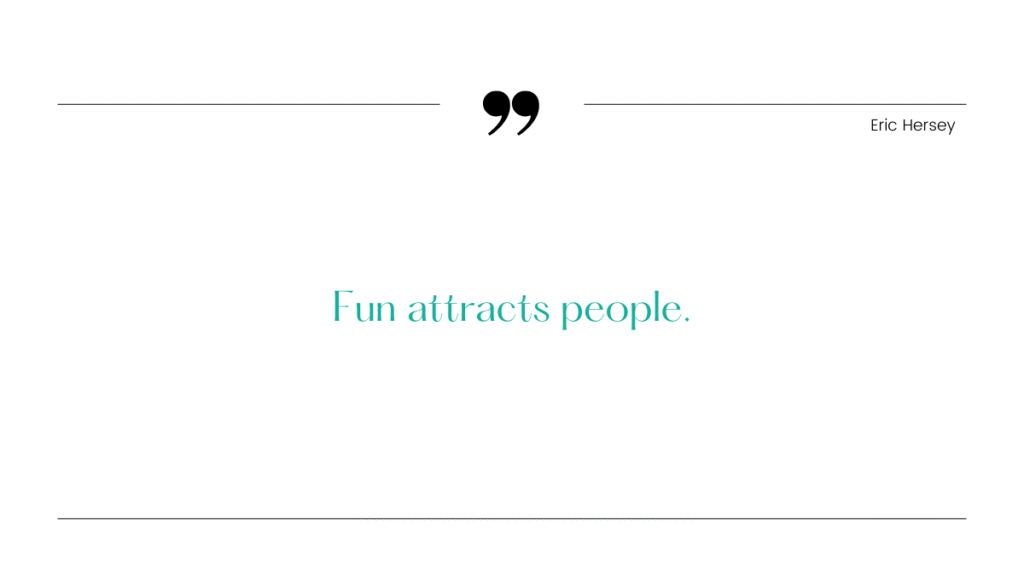
Eric: Am I at Disney? every single day for 365 days. I got more business from that stupid thing than anything else because I was visible, but it was just me being dumb. But it was fun for me to find a picture that I wanted to share. It was very obvious by day 30 that I wasn’t at Disney. Especially when my kids are jumping 12, 8 years in age between pictures. But that stuff was fun.
Liz: You did that for a full year?
Eric: 365 days. I think consistency is a real big… especially in my business, I think people that can do something consistently, say they’re going to do it and do it matters. If you post enough of them, Google recognizes your authority and your consistency. They’ll rank you… They’ll say, “Well, he just wrote 40 blogs about web design. He’s probably one of the best web designers here.” When somebody types web design near me, I show up. So it helps, but if you’re writing it hoping that people are going to see every single thing and reach out to you, it’s very difficult. It’s almost demoralizing because from a creative standpoint, you work and you try real hard, so you have to go into it knowing that you’re writing it just for yourself. I don’t care if anybody else reads this. And that’s how it got me through doing all that because I felt like I had something… If I just wanted to write a stupid joke and have it in there, I had the ability to do it. So it made me happy.
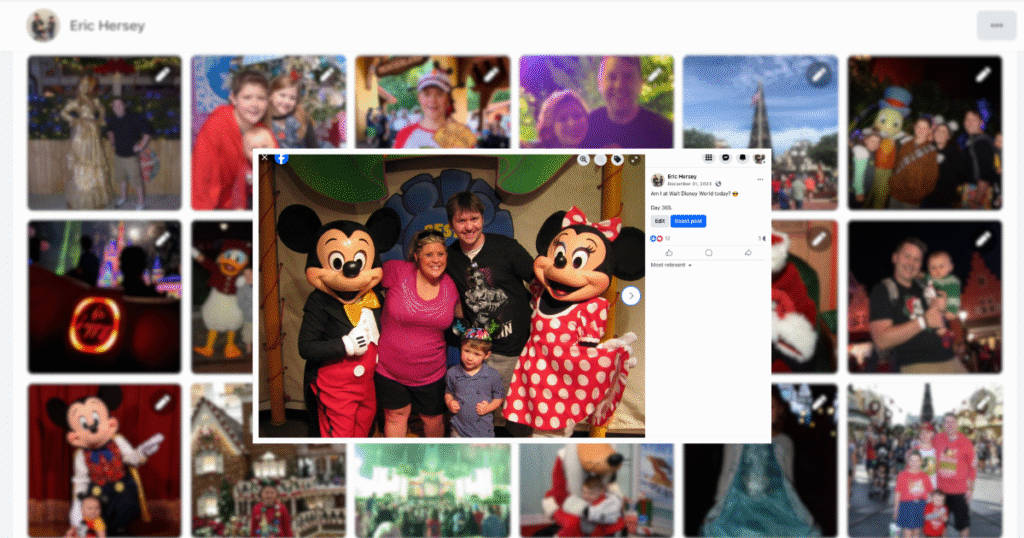
But being a business with a team of employees derailed him for a hot minute. When Eric began hiring employees, he took on many new responsibilities that pulled him away from his original passion. The transition from individual contributor to business owner created a significant identity shift -but it was only a detour.
Eric: I went away from it because I ran out of time. So this year, once again, we’re writing blogs. we’re making podcasts, we’re making videos.
Liz: And the reason for it is?
Eric: Because my word is fun, because I felt like I stripped away a lot of the fun of this job. I mean, if you can’t have fun, if you own your own business and you can’t have fun and dictate what you want to do, then what chance do we have in anything else?
Eric so loves his work, he finds himself immersed in it all the time.
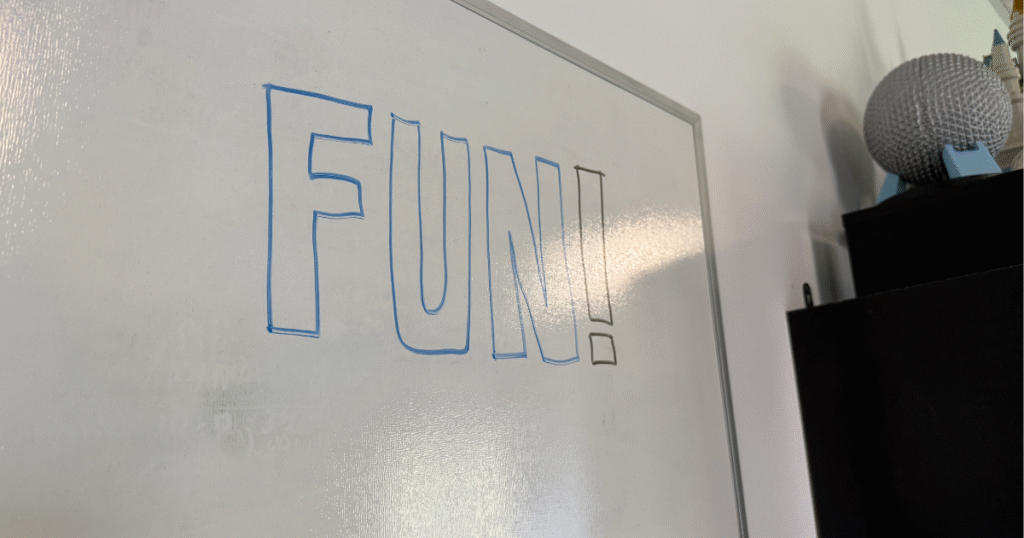
Eric: I get dad guilt from all of it. And I think it’s because… I don’t know. I mean, from a parent standpoint, I work from home. They think I’m always working. I don’t think I’m working almost ever because it’s more fun… I don’t know. It’s just fluid for me. If you email me at seven o’clock, I might just go email you back. And that’s a blessing and a curse. I don’t know if the guilt will go away, if there’s always guilt. Miles has a pretty good life. He’s doing fine. I’ve said it way too many times, probably. If he doesn’t know how to read by high school, I’ll have a problem. I don’t try to force it early. There’s nobody, in my opinion, that says, You have to know this by a certain date. I think we all learn differently and do it at different stages. When we felt like he was falling behind, we very much took the actions necessary to try to catch him up. If he caught up, great. But I can’t speed that stuff up. You can’t force somebody to learn something. The only thing we could do is give him the best opportunity. And I feel like that’s what we’ve done. So I guess that’s maybe where the dad guilt rests, I try to justify it, knowing that, yes, I don’t read many books to him. But I didn’t read many books to any of my kids. It’s just not my thing.
Liz: So where’s the reading books come from? Is that just what you’re supposed to do if you’re a good parent?
Eric: Yeah. But You know what I did? I realized that I don’t necessarily have the skill sets to be that parent that most people think of. I have skill sets to be a good parent in other ways. Lainee and I are doing a podcast. I think that’s a cool thing you can do with your kid. We go to Disney, we do all types of fun things. But I was never one to be like, All right, let’s read together.
Liz: Now, you have to publicly admit you’ve done something for your son’s passions that I don’t know a single other parent who has. You have a wrestling ring in your basement.
Eric: That’s not his passion. That’s me. That was a promise.
Liz: So that’s just you transferring it on to him?
Eric: No, no, no, no, no. That is me making a promise to myself. That is an Eric Hersey midlife crisis promising the 16-year-old Eric who basically wanted a wrestling ring, that I was going to buy one one day. So the fact that Miles and Lainee get to participate in that is more so because I promised myself that I was going to do it. And I have no reason for it. My knees are obviously bad now. I can’t do anything fun with it. Miles can play in the ring, and Lainee can play in the ring, but that ring was for me. I told people forever I was going to buy a wrestling ring. Wrestling, oddly enough, is very crucial in my life. My dad died when I was 16. My mom did not work, so we were low income, if that was even a word. So I was pretty poor. And when my dad died, it was into the wrestling of Steve Austin, the raw resurgence there. So I was a backyard wrestler.
Not knowing what to do with the emptiness left physically and emotionally when his father died, Eric filled that space with wrestling – not just the physical sport but the branding and entertainment of it all too.
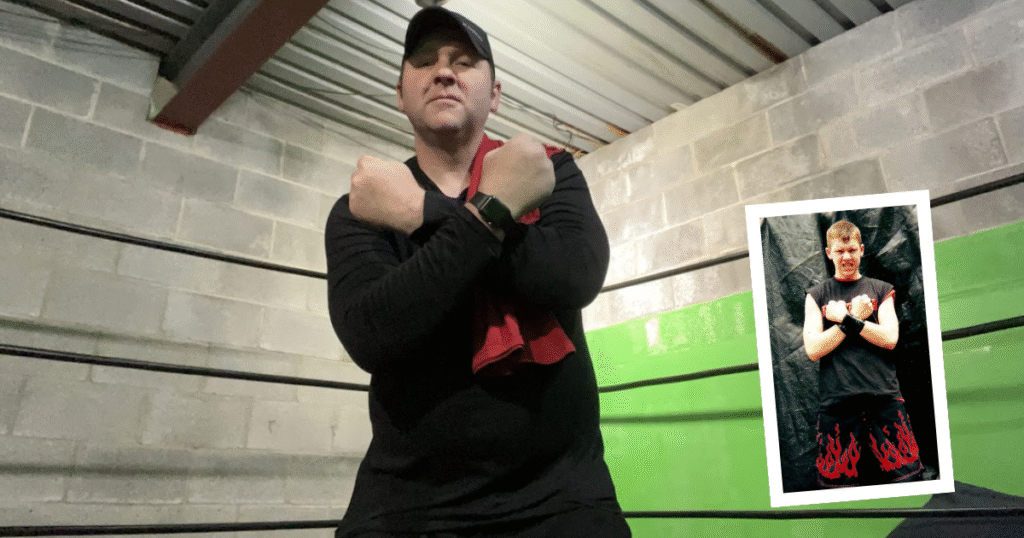
Eric: Backyard wrestling was a craze in the ’90s, where the teenagers would emulate their stars, and they would go in the backyards and fight each other in a choreographed way. We created our own little wrestling organization. Me and about 20 of my friends, and I was the owner/orchestrator of it, and we’d have events every Sunday. I’d get four mattresses, we’d have big tarps, and we’d videotape it and have story lines. Everybody had characters and theme music and all that stuff. Real orchestrated. Well, typically, when you lose a parent when you’re 16, you don’t really have a good foundation any other way. A lot of my friends experienced divorces and stuff like that, but I had this thing of mine, so I kept going. Essentially, that helped me through a pretty tough time – having this federation and branding it and marketing it. We got invited to go to Ricki Lake.
My character’s name was Hostile. I was a tormented soul, of course, as you would be in the ’90s. Almost like a goth type, to an extent. But I told myself back then that I was going to own a wrestling ring one day. And I told enough people that, that I said, I’m still going to. So every time we looked at the house, I always planned out where I was going to put that ring.
Liz: It’s a pretty big polarity to go from the character of Hostile to the theme being fun for this year.
Eric: Yeah. Maybe it’s a polar opposite where I’m playing a different role.
Liz: Do you feel like you’re playing a role, or do you feel like this is the authentic role now?
Eric: I think fun is the authentic role. I think you go through times. Obviously, when I was 16, I was dealing with the death of my father and stuff like that. Obviously, I was tormented. I mean, I had rough years, but I’m very, very thankful that somehow I made it out. I mean, it’s not even somehow. I got very fortunate to meet Lauren. We’ve been together since I was 17, I think. So she’s always seen potential in me and pushed me from one job to the next to the next to the next to say, “Hey, you can do this stuff,” where I’m just trying to have fun. I never really sought out to be a business owner or do anything. I just wanted to make cool websites for passion projects. And then somebody said, “You know people pay you for this.” And I still make fun projects. I just reached out to a Disney historian and was like, “Hey, your website’s not very good. I can help you.” And next thing you know I’m working with former imagineers including the guy who invented the Touring Plan.
If I seek fun, then I will be successful. And that’s where I’m like, don’t get in the weeds. If you do things and if you’re authentic to who you are and you have something worth selling or at least worth working with…then I think fun attracts people. I think people want to work with people that are smart, smiling or doing things that are cool. And that’s primarily what, at least this year, is about.
I have it written on a board, plain as day, every single day I see it. If the choice comes up for me to do something that’s fun versus something that makes you more money, I’m probably going to choose fun because I think the fun will make more money in the long run.
Are you following? We moved from backyard wrestling to Ricki Lake to meeting the love of his life to making webpages for a Disney Imagineer. Yes, Eric’s is a neurodivergent brain… thankfully. He doesn’t follow a prescribed path – not on foot, trust me, or in his story. But if you press pause and slow the story down, you see so many creative pursuits that naturally flow from one another. And you need to – slow the story down, that is, when you talk to Eric because his words come as fast and as furious as the thoughts that enter his mind.
Eric: A weird thing affected me, and it comes off as a weird legacy. I was really upset that my dad didn’t have an online legacy because he existed before the Internet. You can’t Google him and find anything about him. That really upset me. Not so much that Lauren never met him, but anybody that knew my dad, it’s all what it is. You just have a little pocket of these people that knew who he was. They didn’t document anything. So I wrote this blog back when I was doing laps here. I was basically thinking, “Hey, my dad deserves better than that.” So I did what I could and shared as much as I knew about him, which is not a tremendous amount because, let’s be real, we didn’t have too many hard-found conversations prior to… age 16. It’s not like I sat down and said, “Tell me about your life.” So I wrote the blog, but this year at Thanksgiving, a guy emailed me. It was Dad’s best friend who found his blog when he was Googling him. He shared all types of cool stuff about him. And I was just super happy.
Eric found a way to allow his father to leave a legacy for him and anyone else who cared…even if he wrote it himself. Walking did that. He wasn’t walking with me that day. He was just following his thoughts as he waited for his children to finish piano lessons. A muse moment as I like to call it. Eric wasn’t just inspired by the muse, he acted on it. He got back in the car and wrote the blog and a few years later he received the collateral beauty of a mind that is always active. He learned something new about his father.
Of course, Eric now has other dreams.
Eric: For someone like myself who thinks the online is your legacy now… how people can find about you when you’re gone, to know my dad didn’t have anything…
He doesn’t finish the thought. He is on to the next one.
Eric: My mom barely has anything, but I can change that.
I am sure he is writing that in his mind, as a new idea and then another lands abruptly on his train of thought.
Eric: For Christ’s sake, I could probably figure out how to get my dad an IMDb page. Oh, wow. I don’t think so. Maybe. Maybe. Maybe.
There is no maybe about it. He will figure out a way. Afterall he has given himself a task, so he will have to see it through. This brain is never still. This creative mind doesn’t recognize boundaries. When it encounters a locked door, it doesn’t simply look for the key—it questions why doors exist at all. Sometimes this brain works in whispers, quietly suggesting connections while washing dishes or watching a movie. Other times, it arrives in thunderclaps of insight while walking laps in Centre Market. Every new idea becomes raw material for the next creation, transforming endings into beginnings in an endless cycle of renewal.
Eric Hersey has learned to trust the spinning, to stay open to the constant flow, and to capture the sparks as they fly by. Make sure you are paying attention or he will turn right abruptly and whip you into the next idea. You wouldn’t want to miss the fun of it all.

